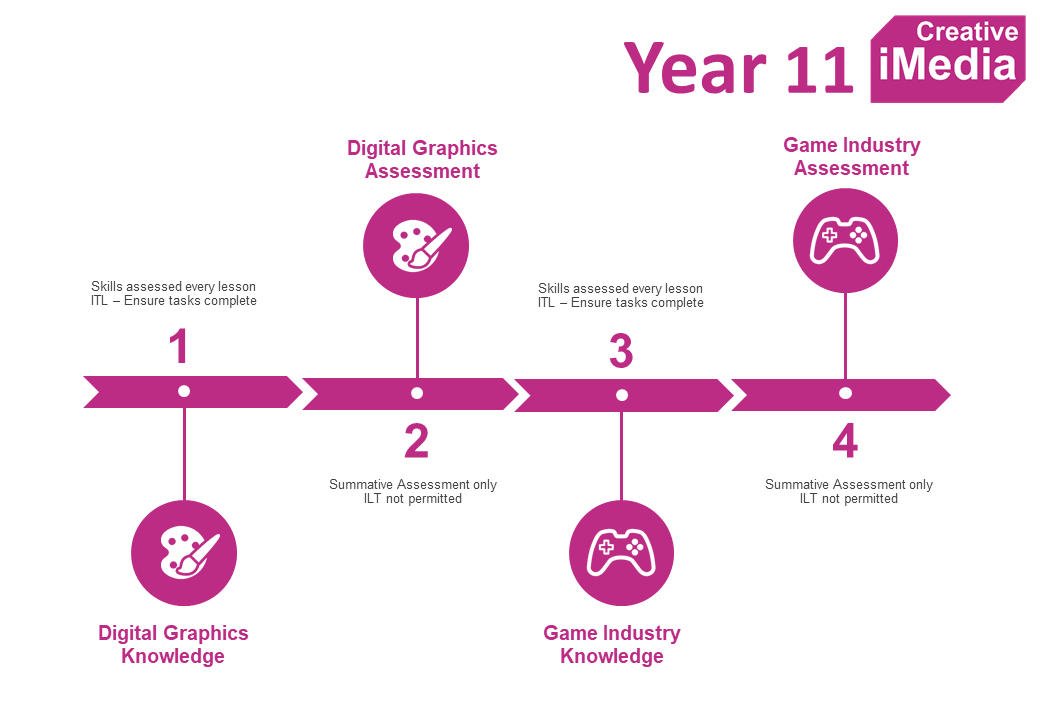Why do we study Computing?
Computing at Hurworth enables students to acquire new skills in the three disciplines of Computer Science, Digital Literacy and Online Safety. Our aim is to create digital citizens whom are confident, safe users of technology.
- The Computer Science elements of the course aim to provide students with problem solving skills and basic knowledge of computer systems.
- Digital literacy modules aim to provide learners with lifelong ICT skills including Microsoft Office proficiency and the ability to create and edit digital images.
- Online Safety components of the curriculum ensure that students have the skills to use digital devices safely and what to do in potentially dangerous situations.
The Confederation of British Industry (CBI) have stated that true employability depends on mastering the basic skills in communication, self-management, team working, problem solving, application of IT, business and customer awareness and the application of numeracy. All of these skills are developed in Computing.
Year 7
Learning Outcomes
Students shall use the design process to set up a game design company.
- Develop foundation office skills.
- Recognise online safety practices.
- Develop a logo for a purpose.
- Create algorithms to control real world scenarios.
- Create a text adventure game using sequence and selection.
Learning Outcomes
Autumn Term
Basic skills and routines
Online Safety
Spring Term
Branding & identity
Algorithm training with flowcharts
Summer Term
Game design for beginners
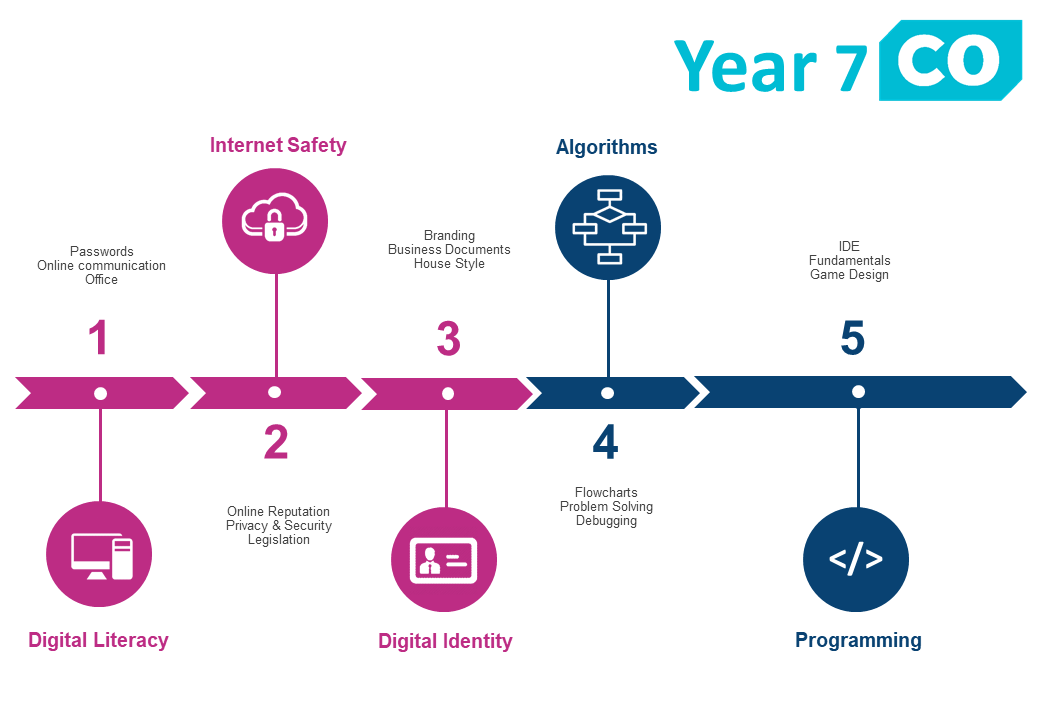
Year 7 Documents (click to download)
Year 8
Learning Outcomes
Students shall use the design process to develop their game design company.
- Design a computer system for a purpose.
- Develop Spreadsheet skills.
- Investigate the threats to a computer network.
- Create a digital graphic for a purpose.
- Create a text adventure game using modular sequence, selection and iteration.
Learning Outcomes
Autumn Term
Computer Hardware
Graphic Design
Spring Term
Network Security
Digital Graphic design
Summer Term
Intermediate Game Design
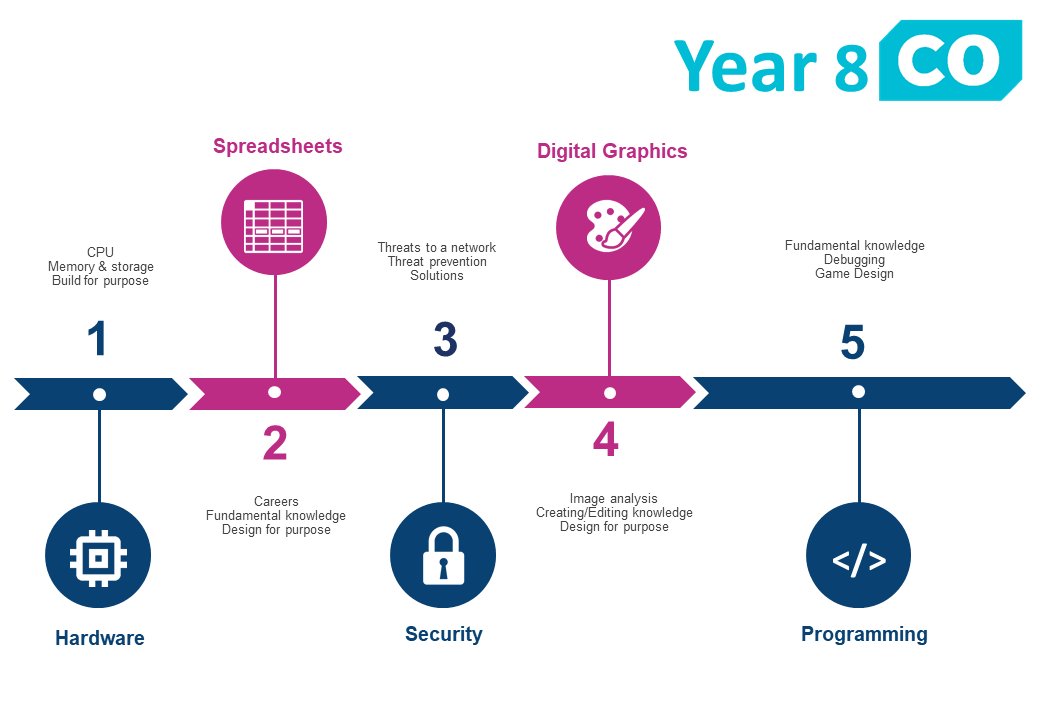
Year 8 Documents (click to download)
Year 9
Learning Outcomes
Students shall use the design process to further develop their game design company.
- Design a computer network
- Create pre-production documents
- Create a text adventure game using modular sequence, selection and iteration
- Achieve the Bronze iDEA Award
Learning Outcomes
Autumn Term
Network Design
Pre-production documents
Spring Term
Game Design
Summer Term
Data Representation
iDea Award Bronze
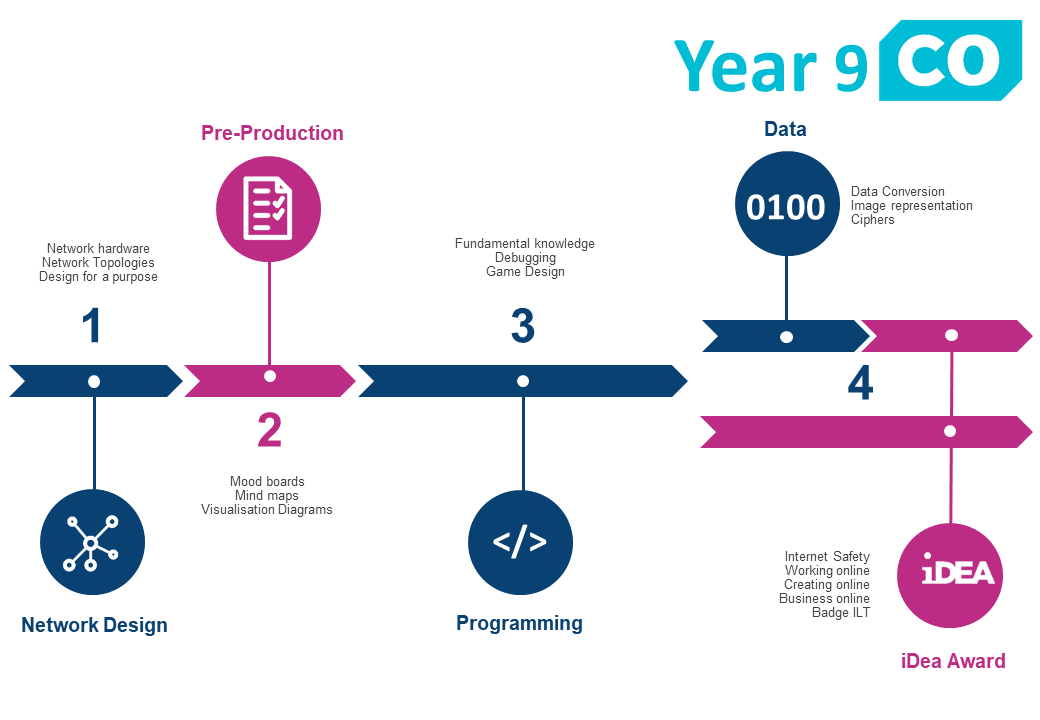
Year 9 Documents (click to download)
Year 10
Exam Specification
Learning Outcomes
This component will encourage students to develop and apply computational thinking skills. Students will be introduced to algorithms and programming, learning about programming techniques, how to produce robust programs, computational logic, translators and facilities of computing languages and data representation. Students will become familiar with computing related mathematics.
Learning Outcomes
Autumn Term
Translators & facilities of languages
Programming techniques
Producing robust programs
Spring Term
Programming Project
Data Representation
Summer Term
Data Representation
Algorithms
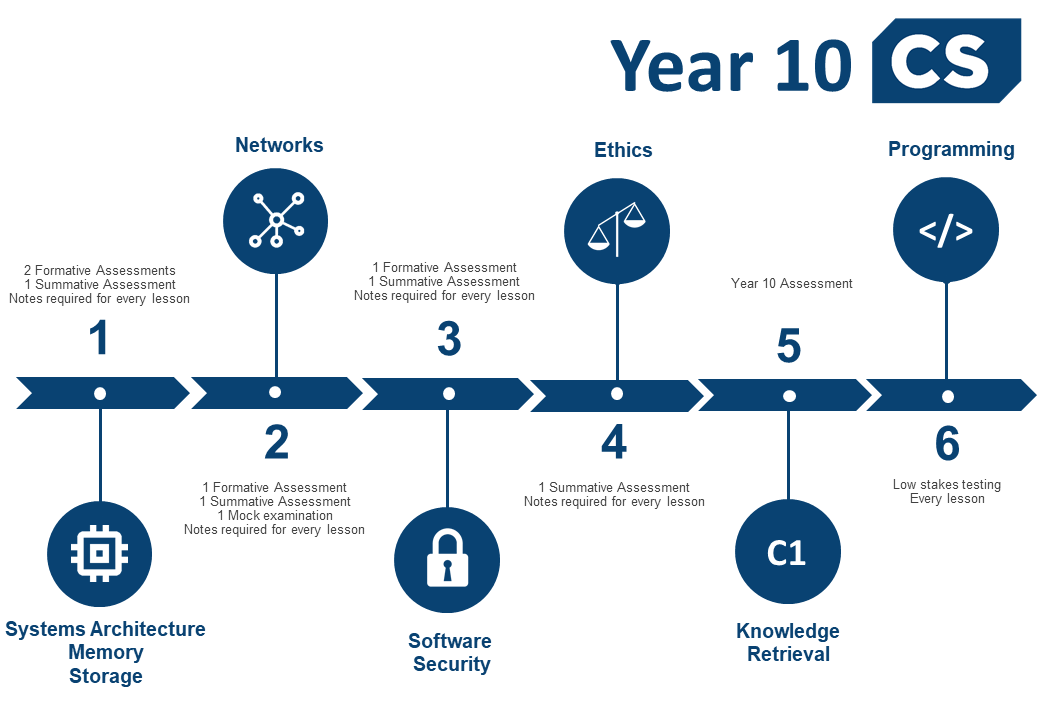
Year 10 Documents (click to download)
Year 11
Exam Specification
Learning Outcomes
This component will introduce students to the Central Processing Unit (CPU), computer memory and storage, wired and wireless networks, network topologies, system security and system software.
Students will become familiar with the impact of Computer Science in a global context through the study of the ethical, legal, cultural and environmental concerns associated with Computer Science.
Learning Outcomes
Autumn Term
Systems Architecture
Memory
Storage
Wired & Wireless Networks
Network topologies, protocols & layers
Spring Term
System Security
Systems Software
Ethics
Summer Term
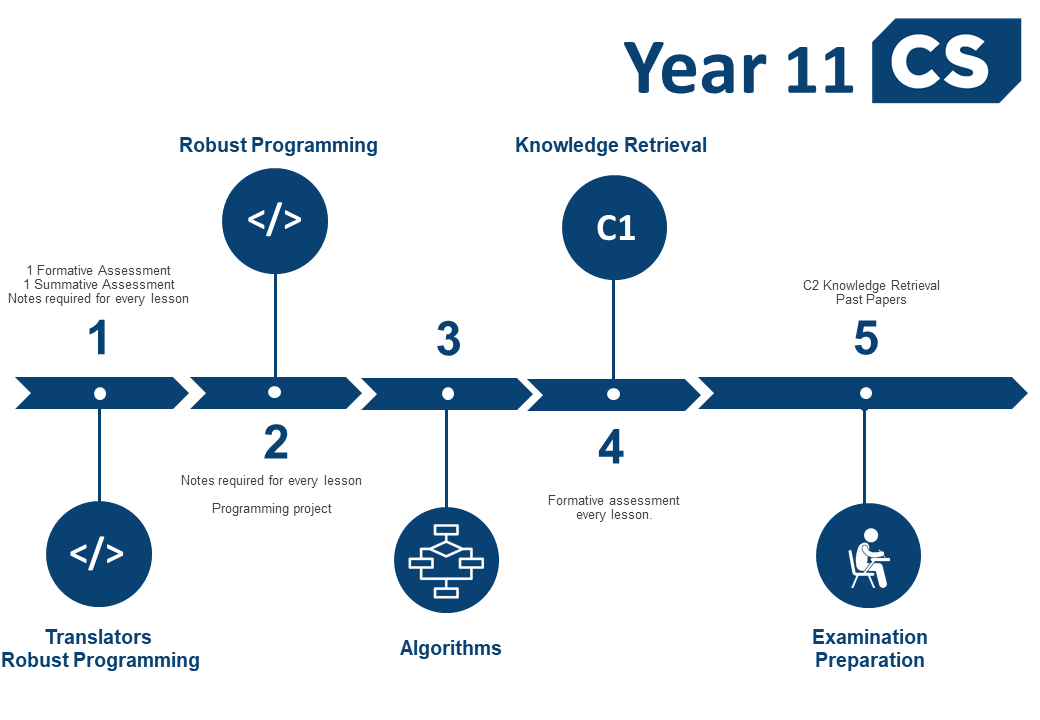
Year 11 Documents (click to download)
Creative iMedia
Year 10
Exam Specification
Learning Outcomes
Visual identity and digital graphics – In this unit you will learn to how to develop visual identities for clients and use the concepts of graphic design to create original digital graphics to engage target audiences.
Topics include:
- Develop visual identity
- Plan digital graphics for products
- Create visual identity and digital graphics
Visual imaging – In this unit you will learn how to plan, create and review portfolios of visual imagery. Topics include: o Plan visual imaging portfolios o Create visual imaging portfolios o Review visual imaging portfolios
Learning Outcomes
Autumn Term
Digital Graphics Knowledge and NEA
Spring Term
Digital Graphics NEA and Visual Imaging knowledge
Summer Term
Visual Imaging NEA
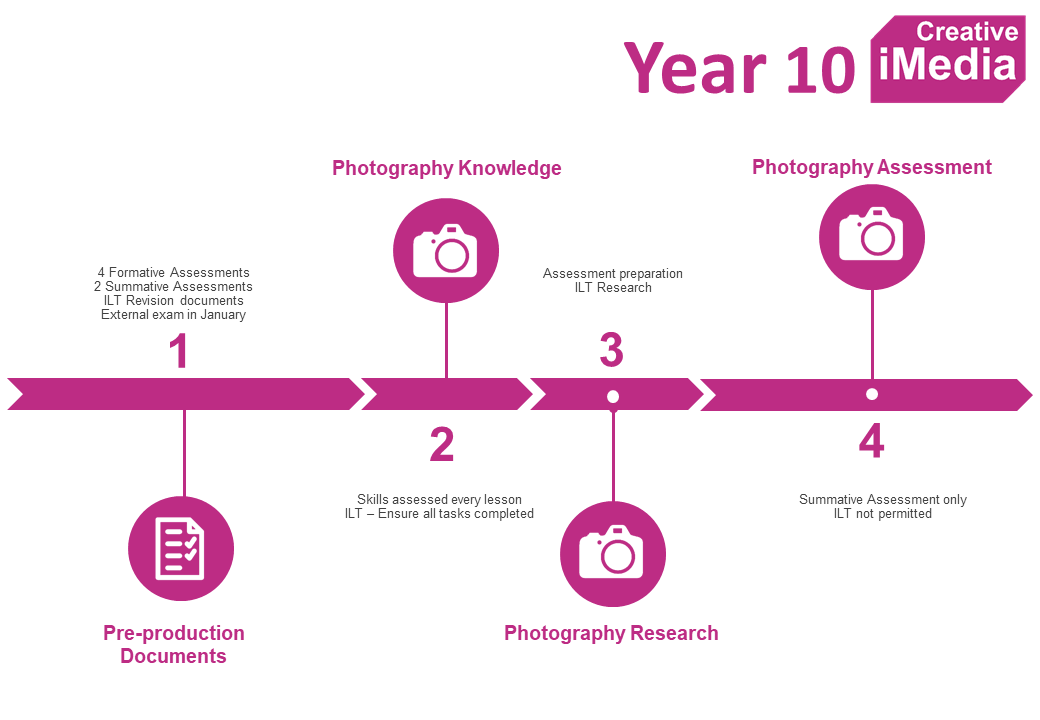
Year 10 Documents (click to download)
Year 11
Exam Specification
Creative iMedia
Cambridge Nationals
Learning Outcomes
Creating a Digital Graphic
Students will understand the purpose and properties of digital graphics, and know where and how they are used. They will be able to plan the creation of digital graphics, create new digital graphics using a range of editing techniques and review a completed graphic against a specific brief.
Learning Outcomes
Autumn Term
Digital Graphics Skills and NEA
Spring Term
Digital Graphics NEA
Summer Term
